Lasswell Harold D. The Political Writings of Harold D. Lasswell
Подождите немного. Документ загружается.

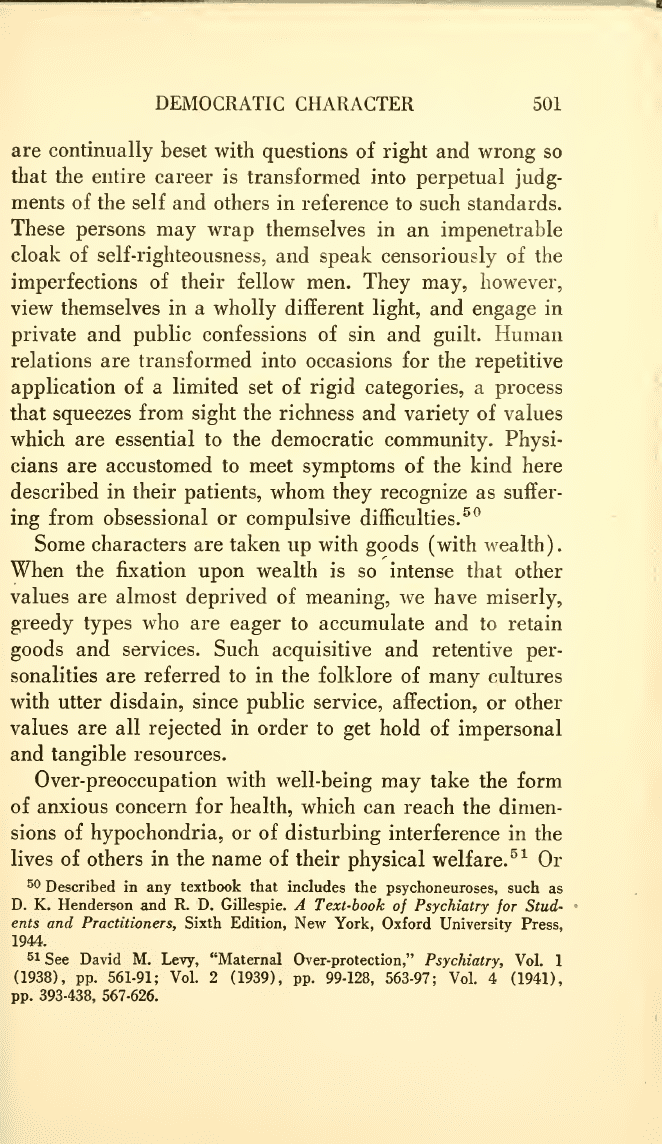
DEMOCRATIC
CHARACTER 501
are
continually
beset
with
questions of right
and wrong so
tliat the entire
career
is transformed
into
perpetual
judg-
ments
of the self
and others
in reference to
such standards.
These persons may
wrap
themselves in
an
impenetrable
cloak of
self-righteousness,
and speak censoriously of
the
imperfections of their fellow
men. They may, however,
view
themselves in a wholly different
light, and engage in
private and public confessions of sin
and guilt.
Human
relations are transformed into occasions
for the repetitive
application of
a
limited
set of
rigid
categories, a process
that squeezes
from sight
the richness and
variety of values
which are essential to the democratic
community.
Physi-
cians are accustomed to meet symptoms
of the
kind
here
described in their
patients,
whom they recognize
as
suffer-
ing from obsessional or compulsive
difficulties.^^
Some characters are taken
up with
goods
(with wealth).
When the fixation
upon wealth is so intense that
other
values are almost deprived
of meaning, we
have
miserly,
greedy types
who
are eager
to accumulate
and to retain
goods and
services.
Such acquisitive
and retentive
per-
sonalities are referred to in the
folklore
of
many
cultures
with utter disdain,
since
public service,
affection,
or other
values
are all rejected
in
order
to
get hold
of impersonal
and tangible resources.
Over-preoccupation with well-being
may
take the form
of anxious
concern for
health, which
can reach
the dimen-
sions
of
hypochondria, or
of disturbing
interference
in the
lives of others
in the name
of their
physical
welfare.
^^
Or
^0
Described in
any
textbook that
includes
the
psychoneuroses,
such
as
D. K. Henderson and R. D. Gillespie. A
Text-book
of
Psychiatry
for
Stud'
ents
and Practitioners, Sixth Edition,
New
York, Oxford
University
Press,
1944.
51
See David M.
Levy,
"Maternal
Over-protection,"
Psychiatry,
Vol.
1
(1938),
pp.
561-91; Vol.
2
(1939),
pp.
99-128, 563-97;
Vol.
4
(1941),
pp.
393-438,
567-626.
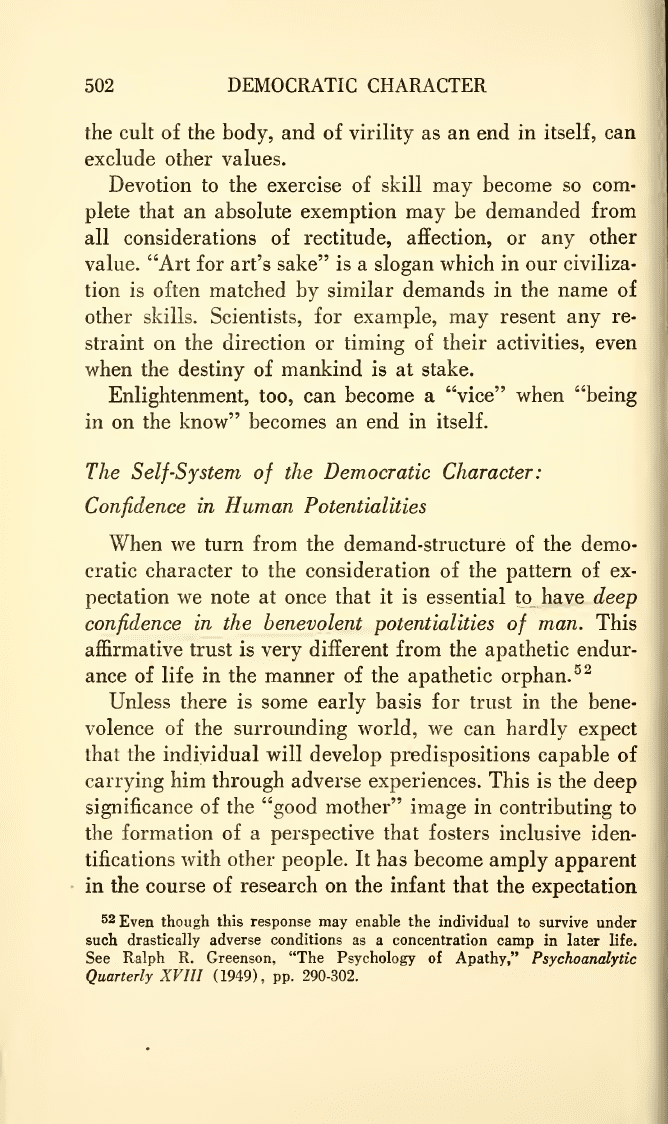
502
DEMOCRATIC
CHARACTER
the
cult
of the body, and
of
virility
as an end
in itself,
can
exclude
other values.
Devotion to the exercise of
skill
may
become so
com-
plete that an absolute exemption may be
demanded
from
all considerations of rectitude,
affection,
or
any other
value. "Art for art's sake" is a slogan which in
our
civiliza-
tion is often matched by similar demands in
the name of
other skills. Scientists, for
example,
may
resent any
re-
straint on
the direction or timing of their
activities, even
when the
destiny
of
mankind is at stake.
Enlightenment, too, can become a
"vice"
when "being
in on the know"
becomes an end in itself.
The
Self-System
of
the Democratic Character:
Confidence
in Human Potentialities
When we turn
from
the demand-structure of the demo-
cratic character to the consideration of the pattern of
ex-
pectation we note at once that it is essential to have deep
confidence
in the benevolent potentialities
of
man. This
affirmative trust is very
different
from the apathetic endur-
ance of life in the manner of the apathetic orphan.
^^
Unless there is some early basis for trust in the bene-
volence
of the
surrounding world,
we can hardly expect
that the individual will
develop predispositions capable
of
carrying him through adverse experiences.
This
is the
deep
significance of the "good mother" image
in contributing
to
the formation of a perspective that fosters
inclusive
iden-
tifications
with other people. It has become
amply
apparent
in
the course of
research on the infant
that
the expectation
52
Even though
this response may enable the
individual to
survive
under
such
drastically adverse
conditions
as
a
concentration
camp in
later life.
See
Ralph R. Greenson, "The Psychology
of Apathy,"
Psychoanalytic
Quarterly
XVIII
(1949),
pp.
290-302.
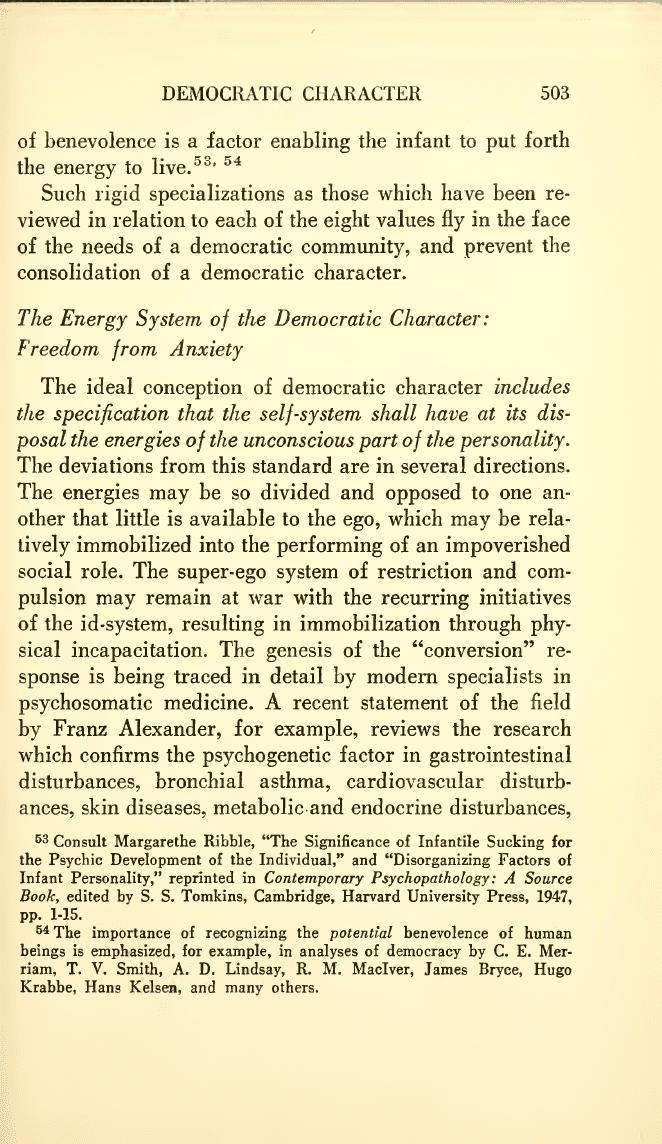
DEMOCRATIC CHARACTER
503
of benevolence
is
a factor enabling the
infant
to
put
forth
the
energy to live.^^'
^*
Such
rigid specializations
as
those
which
have
been re-
viewed in relation to each of the
eight values
fly in the face
of the needs of a democratic community,
and
prevent the
consolidation of
a
democratic character.
The Energy
System
of
the
Democratic Character:
Freedom
from
Anxiety
The ideal conception
of democratic
character
includes
the
specification
that the
self-system
shall
have at its
dis-
posal the energies
of
the
unconscious part
of
the
personality.
The deviations from
this standard are in several
directions.
The energies
may be so divided and opposed to
one an-
other
that little is available to the ego, which may be
rela-
tively
immobilized into the performing of an impoverished
social
role. The super-ego system of restriction and
com-
pulsion
may
remain
at war with the recurring
initiatives
of the
id-system,
resulting in
immobilization through phy-
sical
incapacitation. The
genesis
of the "conversion"
re-
sponse
is being traced in detail by modem
specialists in
psychosomatic
medicine. A
recent statement
of the
field
by Franz
Alexander, for example, reviews the research
which confirms the psychogenetic factor in gastrointestinal
disturbances, bronchial asthma, cardiovascular disturb-
ances, skin diseases,
metabolic
and endocrine disturbances,
^3
Consult Margarethe
Rabble,
"The Significance of Infantile
Sucking
for
the Psychic Development
of
the Individual,"
and
"Disorganizing
Factors
of
Infant Personality," reprinted in Contemporary Psychopathology
: A Source
Book, edited
by S. S.
Tomkins,
Cambridge, Harvard University
Press,
1947,
pp.
1-15.
^^
The importance of recognizing the potential
benevolence of
human
beings
is
emphasized, for
example, in
analyses of
democracy
by
C. E. Mer-
riam,
T.
V. Smith,
A. D.
Lindsay,
R.
M. Maclver,
James Bryce,
Hugo
Krabbe, Hans
Kelsen, and
many
others.

504 DEMOCRATIC CHARACTER
disturbances of the joints and skeletal muscles
(including
rheumatoid
arthritis
and the accident-prone
individual),
and of the
sexual
apparatus.
^^
The basis for ineffectual participation in society may
lie
in the sphere of fantasy (or autistic revery)
rather than
organic malfunctioning. We observe
"autistic withdrawal"
in
forms
of psychic
suffering experienced by some
persons
who limit their human relationships more and more. Some-
times these disturbances are suflEciently
light
to be
called
"neuroses."
But there
are
many kinds of
grave, psychotic
processes that carry the individual
out of
touch with other
human beings. However, all internal conflicts
do
not result
in such conspicuous
restrictions
of overt social activity.
In
varying
degree
the person who is suffering from
a
somatic
disturbance
with
a
psychological basis
may be able to
carry
on a
regular
professional and sociable life. It may
even
be
that the function of the
somatic
symptom
is to
dispose of energies that might otherwise interfere with the
self-system
of the
democratic
character.
^^
However, the self-system of
the democrat may
be be-
trayed chronically or
occasionally by eruptions of conduct
in
flat
contradiction
to democratic
perspectives.
In
many
instances the person is fully conscious of
occasional seiz
ures that contradict his conscious
demands upon
himself,
Some men
"can't
control their temper"
on all
occasions
Others go
in for jags
of
alcoholism
or sexual
debauchery,
^5
Psychosomatic
Medicine
:
Its Principles and
Applications,
with
a
Chap
ter
on
"The
Functions of the Sexual
Apparatus
and Their
Disturbances"
by
Therese
Benedek, New York, Norton,
1950.
56
It should not be supposed
that
the psychosomatic
emphasis
is
alto-
gether new to physicians. Ralph Waldo
Emerson
remarked in
his essay
on
the
poet that he knew
"a
witty
physician
who found
the creed in
the
biliary duct,
and used to
affirm that
if there was
disease
in
the
liver, the
man became
a
Calvinist, and
if that
organ
was sound,
he became
a
Uni-
tarian."
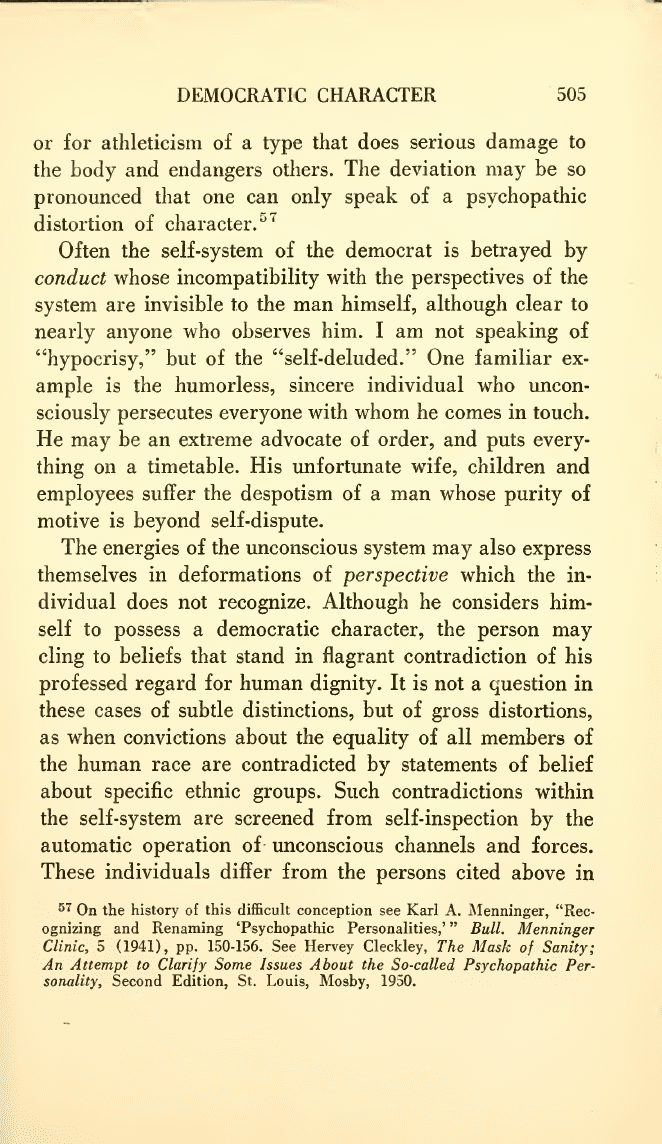
DEMOCRATIC
CHARACTER
505
or for
athleticism of
a
type that
does
serious damage to
the body and
endangers others.
The deviation
may
be so
pronomiced
that one can only speak of
a psychopathic
distortion of
character.^'
Often
the
self-system of the
democrat is betrayed
by
conduct
whose incompatibility
with the perspectives of the
system are
invisible to the man
himself, although clear to
nearly anyone who observes
him. I am not speaking
of
"hypocrisy," but of the
"self-deluded." One familiar ex-
ample is
the humorless,
sincere individual who
uncon-
sciously persecutes everyone with
whom
he comes in touch.
He may be an
extreme advocate of order, and puts every-
thing on a
timetable. His unfortunate wife, children
and
employees
suffer the despotism of
a
man
whose purity
of
motive is beyond
self-dispute.
The energies of the
unconscious
system may also
express
themselves in deformations of perspective
which the in-
dividual does not recognize. Although he considers
him-
self to possess
a
democratic character, the person
may
cling to beliefs that stand in flagrant contradiction
of his
professed regard for human dignity. It is
not
a
question
in
these
cases
of subtle distinctions,
but of gross
distortions,
as
when convictions
about the equality
of
all
members
of
the
human race are contradicted
by statements
of belief
about specific ethnic groups.
Such contradictions
within
the self-system are screened from
self-inspection
by
the
automatic operation of
unconscious channels
and
forces.
These
individuals
differ
from the
persons
cited
above in
5^
On
the
history
of
this difficult
conception see Karl
A. Menninger,
"Rec-
ognizing and
Renaming 'Psychopathic
Personalities,'
" Bull.
Menninger
Clinic,
5
(1941),
pp.
150-156.
See Hervey Cleckley,
The Mask
of
Sanity;
An
Attempt to
Clarify
Some Issues About
the So-called
Psychopathic
Per-
sonality,
Second
Edition, St. Louis, Mosby,
1950.
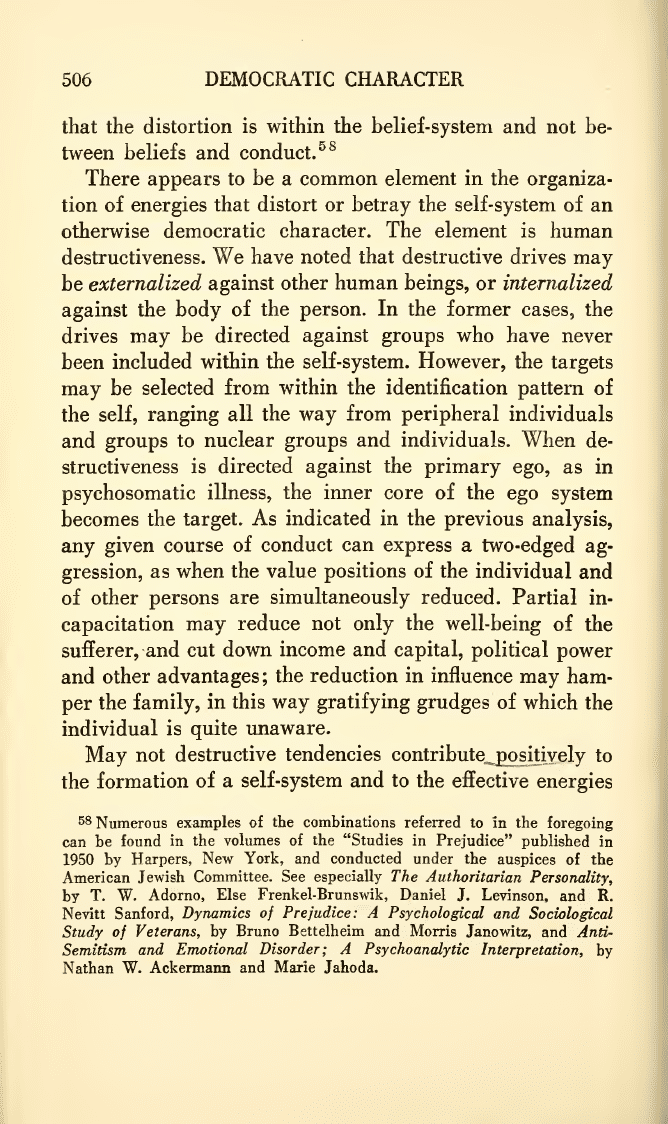
506
DEMOCRATIC CHARACTER
that
the distortion
is within the belief-system
and
not
be-
tween
beliefs and conduct.
^^
There
appears
to
be
a
common element in the organiza-
tion of
energies that
distort
or betray the
self-system
of
an
otherwise
democratic
character. The element
is human
destructiveness.
We have
noted that destructive
drives
may
be
externalized
against
other human beings,
or internalized
against the body
of the
person. In the former
cases, the
drives may
be
directed against groups who
have never
been
included
within the self-system.
However,
the
targets
may be
selected
from within the identification
pattern
of
the
self,
ranging all
the way from peripheral
individuals
and
groups to
nuclear groups and individuals.
When
de-
structiveness is
directed
against the
primary
ego,
as in
psychosomatic
illness,
the inner core
of the
ego system
becomes the
target. As indicated in the
previous
analysis,
any
given course
of conduct
can
express
a two-edged
ag-
gression,
as
when the value
positions
of the
individual
and
of other
persons
are
simultaneously
reduced.
Partial
in-
capacitation
may
reduce not only the
well-being
of the
sufferer, and
cut
down income
and
capital,
political
power
and
other
advantages;
the
reduction
in influence
may
ham-
per
the
family,
in this
way gratifying
grudges
of which
the
individual
is
quite
unaware.
May
not
destructive tendencies
contribute^positively
to
the
formation
of a
self-system and to
the effective
energies
58
Numerous
examples of
the combinations
referred
to in the
foregoing
can
be
found
in the
volumes of the "Studies
in Prejudice"
published
in
1950
by
Harpers,
New
York,
and
conducted
under
the
auspices
of the
American
Jewish
Committee. See especially The
Authoritarian
Personality,
by
T. W.
Adorno,
Else
Frenkel-Brunswik,
Daniel
J.
Levinson,
and R.
Nevitt
Sanford,
Dynamics
of
Prejudice:
A Psychological
and
Sociological
Study
of
Veterans,
by
Bruno Bettelheim
and Morris
Janowitz,
and Anti-
Semitism and
Emotional
Disorder; A
Psychoanalytic
Interpretation,
by
Nathan W.
Ackermann
and
Marie
Jahoda.

DEMOCRATIC
CHARACTER 507
available to the democratic character? To
take the latter
part
of tlie question first, it is apparent
that the destructive
energies
of a
person may
be
directed against enemies of the
democratic community.
Indeed, any
other behavior would
betray the opportunities
and
responsibilities
of democratic
citizenship. The reply
to
the first part
of
the
question
is
less categorical.
Modem studies of human development
repeatedly show that democratic responses
often arise
from
motives which are incompatible with
it, and signify
that the individual
has achieved part
of
his democratic
outlook
by
"reaction-formation"
against tendencies
of an
opposite
kind. Many democrats
appear to develop
in
op-
position
to anti-democratic parents,
for example.
And yet,
from the
point of view
of modern personality
research,
the
characters which
are
achieved
by
a
complex
process
of balanced defense
are viewed as constituting
less endur-
ing
formations than those which
evolve more directly.
A significant
insight into the
djmamics of non-demo-
cratic character
is contained
in the studies of prejudice
alluded
to
above.
Prejudice was defined
in several
ways,
ranging
from
denials
of respect
(as
defined
in our list of
values),
to
denials
of access
to
all
values irrespective
of
common humanity
or individual merit. The intensity
of
the prejudice
might range from
mildly
derogatory
reveries
and remarks to militant activism designed to exclude
target
groups
from the community (or from effective
participa-
tion therein according
to
democratic norms).
The
research
succeeded in demonstrating that prejudiced
attitudes were
not only
connected
with
immediate,
situational
factors, but
that they represented a
carry-over from
early experiences
in
which
a
certain
pattern
of character had been formed
during early
years of
life.
Within
our
culture,
at
least,

508 DEMOCRATIC
CHARACTER
the emerging picture
of interconnection
was
summed
up
as
follows:
The most crucial result of
the present
study, as it seems to the
authors, is
the demonstration of
close correspondence in
the type
of
approach and outlook
a subject
is
likely
to have in a great
variety
of areas,
ranging from
the most intimate features of
family
and sex adjustment through
relationships
to other people
in general,
to religion and
to social and political philosophy.
Thus
a basically hierarchical,
authoritarian, exploitive parent-child re-
lationship
is apt to carry
over into
a power-oriented,
exploitively
dependent
attitude
toward
one's sex partner and one's God and
may
culminate
in a political
philosophy and social outlook
which
has no
room
for
anything
but
a
desperate clinging
to
what
ap-
pears to be strong
and
a
disdainful
rejection of whatever is
rele-
gated to
the bottom. The
inherent dramatization likewise
extends
from the
parent-child
dichotomy
to the
dichotomous conception
of
sex roles and
of moral values,
as
well
as to a dichotomous
handling
of
social
ingroup-outgroup
cleavages. Conventionality,
rigidity,
re-
pressive
denial,
and the ensuing break-through of one's
weakness,
fear
and
dependency
are but other aspects
of
the
same
funda-
mental
personality
pattern, and they can
be
observed in
personal
life
as well
as in attitudes toward religion
and
social issues.
On the
other hand,
there is
a
pattern
characterized chiefly
by
affectionate, basically
equalitarian, and permissive
interpersonal
relationships. This
pattern encompasses attitudes within
the
family
and toward the
opposite sex,
as
well
as an
internalization
of reli-
gious and
social
values.
Greater flexibility and
the
potentiality for
more
genuine
satisfactions appear as
results of this basic
atti-
tude.
5
9
We know
that
repetitiveness is one of the
most
frequent
"defense
mechanisms"
by
the
use
of which the ego
prevents
itself from
being swamped in a
flood
of
anxieties and
hos-
tilities.
The rigidification
goes so
far
that the
perceiving
processes of the
ego
system are affected, and
relevant
feat-
ures
of a novel
situation
are
pressed
into established
5^
The Authoritarian Personality,
p.
971. The
essential conclusion
is con-
firmed
in many respects
by
the
Bettelheim-Janowitz and
the
Ackermann-
Jahoda investigations.
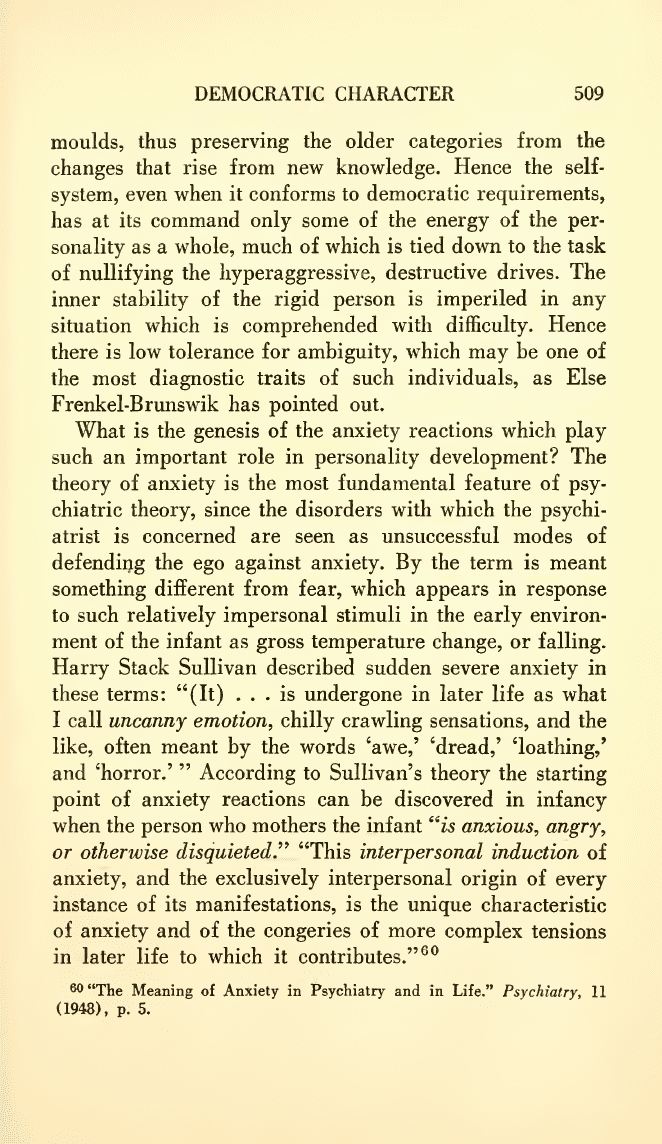
DEMOCRATIC CHARACTER
509
moulds, thus
preserving the
older categories from the
changes
that
rise from new knowledge.
Hence the self-
system, even
when it conforms to
democratic
requirements,
has
at its
command only some of the
energy of the per-
sonality as a
whole, much of which is
tied down to the task
of
nullifying the
hyperaggressive,
destructive drives. The
inner stability of the
rigid person is
imperiled in
any
situation which is
comprehended with
difficulty.
Hence
there
is low tolerance
for ambiguity, which may be one of
the most
diagnostic traits of
such individuals, as Else
Frenkel-Brunswik has pointed
out.
What is the
genesis of the
anxiety reactions which
play
such
an important role in
personality
development? The
theory of
anxiety
is
the most fundamental feature of
psy-
chiatric
theory, since the disorders with which the psychi-
atrist is concerned are seen as
unsuccessful
modes of
defending
the
ego
against anxiety. By the term is
meant
something different from
fear, which
appears
in
response
to such
relatively impersonal stimuli
in
the early
environ-
ment of the
infant
as
gross
temperature change, or falling.
Harry Stack Sullivan described
sudden severe anxiety
in
these terms: "(It)
. .
.
is undergone in later life
as what
I call uncanny
emotion,
chilly crawling sensations,
and the
like,
often
meant
by the words 'awe,'
'dread,' 'loathing,'
and
'horror.'
"
According
to Sullivan's theory
the starting
point
of
anxiety reactions can be
discovered in infancy
when the person who mothers the infant
"w anxious, angry,
or otherwise disquieted." "This interpersonal
induction
of
anxiety, and the
exclusively
interpersonal origin
of every
instance of its
manifestations,
is
the
unique
characteristic
of
anxiety
and of
the congeries of more
complex
tensions
in later life to
which it contributes."^^
60
"The Meaning
of
Anxiety
in
Psychiatry
and in Life."
Psvchiatry,
11
(1948),
p.
5.
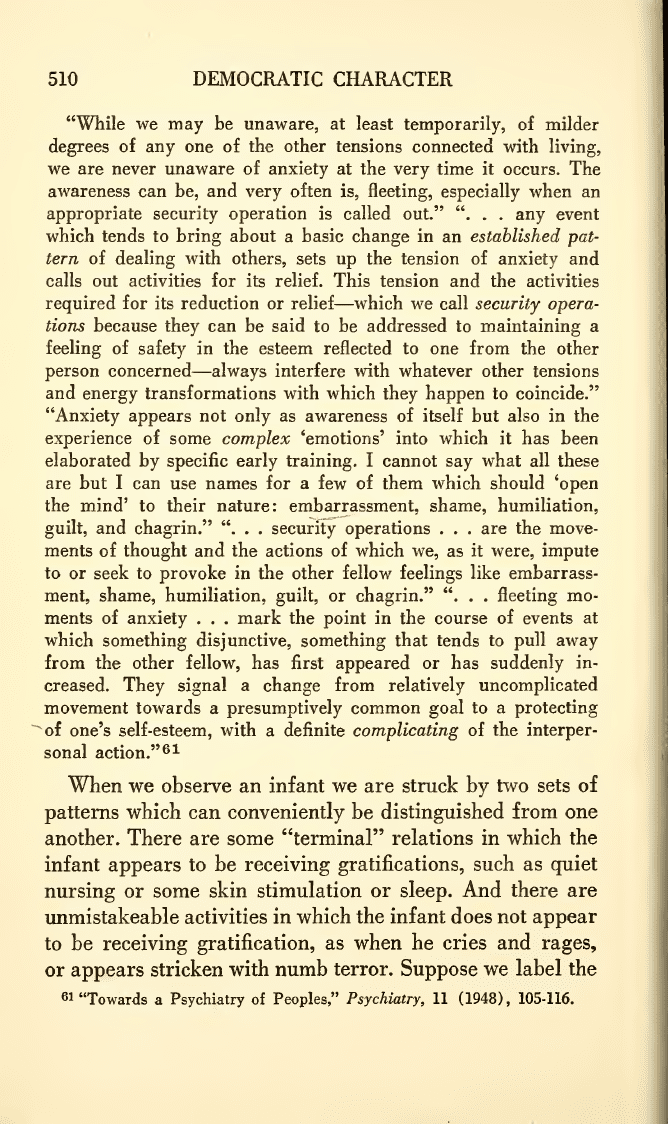
510 DEMOCRATIC CHARACTER
"While we may be unaware, at
least temporarily, of
milder
degrees
of any
one of
the other tensions
connected
with living,
we are never
unaware of anxiety
at the very time it
occurs. The
awareness can be, and very
often
is, fleeting, especially
when an
appropriate security operation
is
called
out."
".
. . any event
which
tends
to
bring
about
a
basic change in
an
established pat-
tern of dealing with others,
sets
up the tension of
anxiety and
calls out activities for
its
relief. This tension
and the activities
required for
its reduction or relief—which we call security opera-
tions
because they can
be
said
to be
addressed
to
maintaining
a
feeling of
safety in the esteem reflected to one from
the
other
person
concerned
—
always interfere with whatever other
tensions
and energy transformations
with which they happen to coincide."
"Anxiety appears not only as awareness of itself but also in the
experience of
some complex
'emotions'
into
which
it has been
elaborated by specific early training, I cannot say what all these
are but I can use
names
for
a few
of
them
which should
'open
the
mind' to their nature: embarrassment, shame,
humiliation,
guilt, and chagrin."
".
. .
security operations
. . .
are the move-
ments
of thought and the actions
of which
we,
as
it were,
impute
to or seek to provoke in the other fellow feelings like embarrass-
ment,
shame,
hiuniliation,
guilt, or
chagrin."
".
. .
fleeting mo-
ments of anxiety
. .
. mark the point in the course
of
events
at
which something disjunctive, something that
tends
to
pull
away
from the other fellow, has first appeared or has
suddenly in-
creased. They
signal a change from relatively
uncomplicated
movement
towards a
presumptively common goal to a
protecting
of one's self-esteem, with
a
definite complicating of
the interper-
sonal action."
^^
When
we observe an
infant
we
are struck by two
sets of
patterns
which can
conveniently
be
distinguished
from one
another.
There
are some "terminal" relations in
which the
infant appears to
be receiving
gratifications, such as
quiet
nursing or some
skin stimulation
or sleep. And there are
unmistakeable activities in
which the infant does not
appear
to be
receiving
gratification, as when he cries
and rages,
or
appears stricken
with numb
terror.
Suppose
we label the
61
"Towards
a
Psychiatry
of
Peoples,"
Psychiatry, 11
(1948),
105-116.
